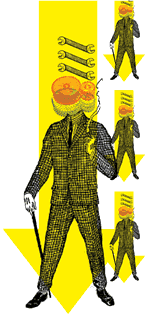
When Thomas Jefferson determined the “pursuit of happiness” to be one of humankind’s unalienable rights, he could not have foreseen the consequences of dangling this elusive proverbial carrot under the noses of subsequent generations. For the average proponent of free market economics, and by extension the average consumer, this phrase is synonymous with the accumulation of capital. If this notion were rooted in truth, one would expect the beneficiaries of the most successful marketplace in history – the American middle-class – to be living in a veritable state of pure ecstasy.
Since the end of World War II, almost every measurable indicator of quality of life among the middle-class has increased. Figures for per-capita income, longevity, home size, cars per driver, highest degree earned, and IQ scores have consistently shot upward and yet it seems happiness has flat lined. Not only has the economic growth of the last fifty years done nothing to improve subjective well-being, it is correlated with a shocking jump in the number of people who suffer some form of “unipolar” depression. Adjusting for population growth, ten times as many people in Western nations experience depression than did half a century ago. In fact, the main triggers of depression and addiction – stresses induced by social isolation and dislocation – are necessary results of liberal economic policy.
What most of us know about depression we’ve learned from the multi-billion dollar pharmaceutical industry. We’ve seen the animated Zoloft commercials showing two nerves with chemicals moving between them. The voiceover tells us, “While the cause is unknown, depression may be related to an imbalance of naturally occurring chemicals between nerve cells in the brain.” At the top of the animation the Zoloft logo is shown as the announcer continues, “Zoloft, a prescription medicine, works to correct this imbalance.” 1988 marked the advent SSRI antidepressants like Pfizer’s Zoloft, believed to fight depression by increasing levels of serotonin and other neurotransmitters. Pfizer, Eli Lilly, and other large pharmaceutical companies spend more than twice as much on marketing than research and development, and their ad campaigns would have us believe depression is merely a biological disorder. Increasingly, however, studies have demonstrated that while some may be genetically prone to experience depression, the triggers of this ailment are largely the result of environmental factors.
Increasingly, however, studies have demonstrated that while some may be genetically prone to experience depression, the triggers of this ailment are largely the result of environmental factors.
Bruce McEwen, director of the neurobiology lab at Rockefeller University has discovered animals undergoing repeated stress, especially early in life, experience neurodegenerative changes in their brain chemistry. Animals subjected to stress resulting from prolonged social isolation experience damage to neurons in the hippocampus which can result in an increased sensitivity to future stress and depression. If social isolation results in depression, it should come as no surprise it is the second most disabling ailment in the West. American consumer culture requires that we define our individuality through the purchase of material goods, unfettered by the family obligations, ties of friendship, community responsibilities, and charitable feelings that lead to strong social relationships. Martin Seligman, a psychologist at the University of Pennsylvania and past president of the American Psychological Association, has listed rampant individualism and runaway consumerism as leading causes of depression.
A study conducted by William Vega, a public health researcher at Rutgers University, confirms how a culture built on consumerism can become hazardous for those who experience it for the first time. Upon studying recent immigrants to the U.S. from Mexico, Vega discovered they were much healthier than the Americans they settled among, with half the rates of psychological disorder. However, their Mexican heritage – grounded in a history of strong family ties – didn’t afford them protection for long. During their first 13 years in the U.S., their chance of developing a disorder in their lifetime was 18 percent. Unfortunately, after 13 years their rates of depression, anxiety and drug problems had risen to 32 percent – the same level as the general population. For Mexican-Americans born in the U.S., the rate of those afflictions soared to 49 percent.
More and more, Americans are retreating inward, satisfying their needs for social interaction through the ingestion mass media and manufactured entertainment.
The growing tide of social isolationism and erosion of community ties in America was brought to mainstream attention in 1995 when Robert Putnam published his essay, “Bowling Alone,” in the Journal of Democracy. In his essay, and in a book with the same name, Putnam traces declining trends of community involvement for the past few decades. He offers a variety of explanations for why this may be occurring, including the rise of the “TV generation.” More and more, Americans are retreating inward, satisfying their needs for social interaction through the ingestion mass media and manufactured entertainment. Other influences Putman cites are: the breakup of the traditional “nuclear family” in exchange for two career households, growing suburbanization and commuting, modern time and financial pressures, and corporate globalization. Putman goes on to make the connection between the disappearance of “social capital” and well-being. Citing an array of psychological studies, Putman concludes, “The positive contributions to health made by social integration and social support rival in strength the detrimental contributions of well-established biomedical risk factors like cigarette smoking, obesity, elevated blood pressure, and physical inactivity.”
Pages: 1 2





No Comments so far ↓
There are no comments yet...Kick things off by filling out the form below.